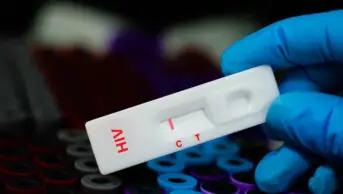
Shutterstock.com
The National Institute for Health and Care Excellence (NICE) has recommended the first long-acting, injectable HIV pre-exposure prophylaxis (PrEP) option for use on the NHS in England and Wales.
In final draft guidance, published on 17 October 2025, NICE approved cabotegravir (Apretude; ViiV Healthcare) for patients who are unable to use oral PrEP, owing to medical contraindications, difficulty swallowing tablets or other challenges to adherence, such as partner violence, needing to conceal medication usage or homelessness.
The injection, which could benefit around 1,000 people in England each year, is administered every two months under the commercial arrangement, NICE said.
Currently, patients can access oral PrEP, which can be taken either daily or on demand.
The Medicines and Healthcare Regulatory Agency (MHRA) first approved the injection as Vocabria in 2021, which was indicated for use alongside rilpivirine injection. In 2024, the MHRA then approved the cabotegravir stand-alone injection.
However, until now, the treatment has not been considered cost-effective by NICE and was previously only available on the NHS if clinicians requested it under the compassionate use programme.
Nadia Naous, chair of the special interest group HIV Pharmacy Association (formerly HIVPA), commented: “The funding of long-acting injectable cabotegravir for PrEP marks a significant step forward in HIV prevention in England. It offers a vital new option for people who cannot take oral PrEP, such as those with medical contraindications or who are unable to take tablets.
“By removing these barriers, injectable PrEP will help more people at risk of HIV protect their health in a way that works for them, supporting progress toward ending new transmissions by 2030.”
Yvonne Gilleece, chair of the British HIV Association, said the new treatment would particularly benefit individuals with high additional vulnerabilities, such as women.
“We have worked hard to ensure the needs of these individuals are considered and the NICE announcement confirms this,” she said.
Matt Phillips, president of the British Association for Sexual Health and HIV (BASHH), said: “Evidence demonstrates that significant inequalities in PrEP uptake persist — particularly among Black African heterosexual women and men.
“BASHH believes that cabotegravir, alongside other evolving PrEP options, can play a crucial role in reducing these disparities and strengthening efforts to make HIV prevention equitable, accessible and effective for all who could benefit.”
According to UK Health Security Agency data, nearly four in five gay and bisexual men who needed PrEP received it, regardless of whether they were white (79%) or from ethnic minority backgrounds (78%) in 2024.
However, in the same year, uptake was lower among heterosexuals — more than one-third of Black African heterosexual women (35%) and men (36%) at high risk of HIV received the treatment, the data revealed.
Phillips said BASHH was “urging swift implementation with a view on equity of access to ensure that those who need it can access this vital intervention quickly, wherever they are in the UK”.
In a statement published alongside the final draft guidance, NICE said: “The rollout of cabotegravir is expected to begin three months after final guidance is published later this year, if not sooner.”
The medication will be provided through existing specialist sexual health services where oral PrEP is currently delivered, and will be administered alongside regular HIV testing, sexual health screening and ongoing monitoring, NICE said.
Jeremy Horwood, professor of social sciences and applied health research at the university of Bristol, commented: “Approval of injectable cabotegravir as PrEP would be a landmark step forward in HIV prevention. For people who face barriers to taking oral PrEP, having a long-acting option isn’t just about convenience, it’s about equity. It’s crucial that rollout plans anticipate the real-world challenges of access, service capacity and patient choice.
“Community pharmacies could play a key role in increasing awareness and access to PrEP and bring us closer to ending new HIV transmissions in the UK.”
In 2024, Horwood and co-author China Harrison published research outlining how community pharmacies could play a role in expanding access to PrEP.


